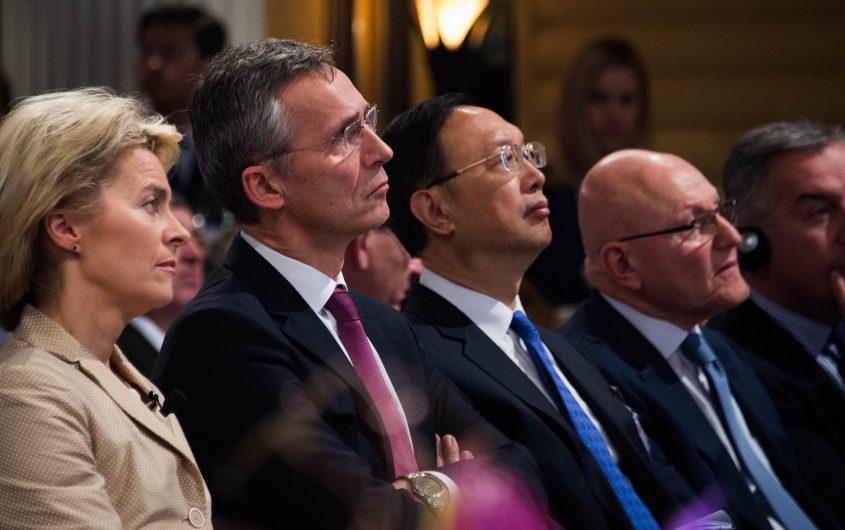
NATO via Flickr
The United States and Europe: The Need for Adaptation

Gale Mattox
Senior Fellow
Dr. Gale A. Mattox is a Senior Fellow at AGI. She was previously Director of the Foreign & Security Policy Program at AICGS and a Professor in the Political Science Department at the U.S. Naval Academy. She is a former elected department chair and chair of chairs, and was awarded the Distinguished Fulbright-Dow Research Chair at the Roosevelt Center in the Netherlands 2009, Fulbright Scholar for NATO Strategic Studies in Brussels in Summer 2017, and Woodrow Wilson International Center for Scholars Fellow in 2016-17. Dr. Mattox served on the Policy Planning Staff of the Department of State, was a Council on Foreign Relations Fellow at the State Department Office of Strategic and Theater Nuclear Policy, and an International Affairs Analyst at the Congressional Research Service.
She has been a Bosch Fellow in Germany (also Founding President of the Bosch Alumni Association), NATO Research Fellow, and a Fulbright PhD Scholar. Dr. Mattox has held the offices of President (1996-2003) and Vice President of Women in International Security (WIIS); Adjunct Professor, Center for Peace and Security Studies at Georgetown University; and served as Vice President of the International Studies Association and co-chair of the ISA Women’s Caucus.
She has served on numerous boards, including the Tactical Advisory Council, Center for Naval Analysis, and the George Marshall Center Advisory Board in Germany; the advisory boards of St. Mary’s College Women’s Center, the Forum for Security Studies at the Swedish National Defense University, and WIIS. Dr. Mattox published Coalition Challenges in Afghanistan: The Politics of Alliance with S. Grenier, Enlarging NATO: The National Debates with A. Rachwald, and Evolving European Defense Policies with C. Kelleher. She is the co-editor of Germany in Transition, Germany at the Crossroads, and Germany Through American Eyes, and has published widely in scholarly journals. She holds numerous awards and has appeared on the Lehrer News Hour and other media outlets. She holds a PhD from the University of Virginia.
__

Karl-Heinz Kamp
Federal Academy for Security Policy, Berlin
Dr. Karl-Heinz Kamp is the President of the Federal Academy for Security Policy, Berlin.
The American-German Institute (AGI) and the German Academy for Security Policy (BAKS) convened a joint workshop on The U.S.-German Relationship: Partnership Under Stress? on June 25-26, 2019, at the German Defense Ministry, Berlin, Germany. It was the third workshop of a four-part series held over the past year. Present were U.S. and German experts from Washington and Berlin. Chatham House rules governed the two days of discussion.
Read report from March conference
Setting the stage, a U.S. participant initiated the discussion reminding all that the two countries have faced and resolved stresses in the past, but are together because of “shared values as liberal societies.” The concept provided a framework for frank discussion throughout the day. Initial remarks addressed German and American fundamental differences in perceptions of the security threat posed by Russia today. Striking for American participants was the recognition of a lack of German debate over a Russian threat to the country. According to a German participant, no German party platform lists Russia as a threat. In response, the U.S. participants pointed to the U.S. National Defense Strategy 2018, underscoring the rising threats from both China and Russia.
Participants generally accepted, if begrudgingly by some, the 2 percent GDP goal decided at the 2014 NATO Wales summit, but diverged on the details and timing of the German contribution. While applauding the growth of defense spending in the past year, the anticipated shortfall by 2024 met with strong criticism. EU efforts in security and defense policy were also discussed. Inclusiveness vs. exclusiveness for the EU’s new Permanent Structured Cooperation (PESCO), the European Defense Fund (EDF), and other EU initiatives drew both praise for the collaboration the initiatives support. But there was also criticism for their exclusive nature, particularly with respect to non-EU members.
A resounding U.S. theme throughout the workshop was support for Germany to assume a more robust leadership role on the world stage while German participants cautioned that historical events and current attitudes are not generally supportive of such a role; several participants pointed to the broadly pacifist nature developed over the years by the German public. Despite this stance by the public, several speakers underscored that elected German officials have a responsibility to make clear to the public that there is a need for enhanced German funding and greater support for defense.
A number of future issues (listed below) also received considerable discussion, including the need for greater attention to the areas of cybersecurity, hybrid warfare, and artificial intelligence. There was agreement that an issue in need of more rigorous future discussion was China. While the importance of China in economic terms has been recognized by Germany, the importance of China for European security has not been sufficiently explored or considered. Workshop participants shared the consensus that Germany needs to begin to deal with the implications of China for longer-term security.
In short, participants addressed the issues listed below:
Burden Sharing
The burden sharing issue will remain an absolute priority for the U.S., particularly should the economic situation in the U.S. experience a downturn. Hence the 2 percent discussion will continue, regardless of how bromidic the arguments on both sides might seem. The tone might get even sharper, the more Germany deviates from the 2 percent/20 percent obligations until 2024.
Burden sharing will receive even more attention, the more the U.S. shifts its strategic orientation to the Asian-Pacific region. Europe will have to follow this trend as it is crucially affected by the rise of China. The major issue is that the 2 percent margin (or the German 1.5 percent goal) is focused on coping with the threat posed by Russia in Eastern Europe. If NATO expands its geographic horizon to Asia, 2 percent will not be enough by far.
German Leadership
Germany has increased its international engagement significantly since the Wales NATO summit in 2014. However, expectations for German action and leadership appear to grow faster than the country (and the electorate) can always support. Moreover, Germany is not using a language that always corresponds with its concept of leadership. Germany fails—as many of its (West) European allies do—to communicate the challenging international developments and the concrete threats to its public. Lacking threat perceptions vis-à-vis Russia partly explain the difficulties of getting more public support for raising defense budgets.
NATO-EU Cooperation
After years of a “frozen conflict” between NATO and the EU, cooperation between the two institutions has improved significantly. But even if significant cooperation and coordination is taking place currently, the strategic goal for NATO-EU cooperation lacks clarity and in key regions is virtually absent, like Jordan or Iraq.
U.S. and NATO
The American engagement in and for NATO seems to be ironclad as there is a bipartisan consensus in Washington on the relevance of NATO for hedging the Russian threat. But this does not dispel European concerns on the credibility of U.S. commitments as the Article 5 question is a prerogative of the president. The Iran case has shown that the president can act spontaneously against the views of his advisors and sometimes the Congress.
U.S.-EU Relations
Washington perceives the EU as being divided and the members often at odds with each other. Particularly Franco-German differences are well noted in the U.S. For Washington, disunity in Europe is not new but it has reached a new quality. As a result, the U.S. acts even more bilaterally with EU capitals instead of talking to Brussels. The U.S. would be interested in a strong Europe, but perceives it as a relatively weak one.
Perspectives on the European Common Security and Defense Policy
The U.S. often criticizes the EU for what it sees as lip service to its promise to do more with respect to a common security and defense policy. The U.S. points to the limited relevance of initiatives like PESCO (Permanent Structured Cooperation) or EDF (European Defense Fund) and tends to ignore the difficult initial conditions for European security and defense policies. Unlike most other EU areas, which had long achieved a high level of integration, ESDP started almost from scratch only a few years ago. Europe notes that fundamental progress cannot be achieved overnight. At the same time, though, the EU needs expectation management not to raise hopes which can never be fulfilled. In that sense, loose talk of EU “strategic autonomy” might not always be helpful.
China
The China challenge is particularly relevant for the U.S. as there is an American/Western disappointment that the economic liberalization in China did not lead to a political liberalization (and today, even the economic liberalization has been turned back in part). In fact, U.S. universities educated the Chinese experts who today develop competing technologies.
It is understandable that the U.S. focuses on a rising China, which might become the only U.S. peer in the global order. For that reason, the Germans need to address their future relationship with China. To date Europe has not fully decided which position it intends to take in a future Chinese-U.S. bilateralism. Many in Europe fail to understand that European security and prosperity might be affected by a rising China as well, both globally and as result of the Belt and Road Initiative. Thus, the future transatlantic relationship will need to be constructed to a great extent around China.









